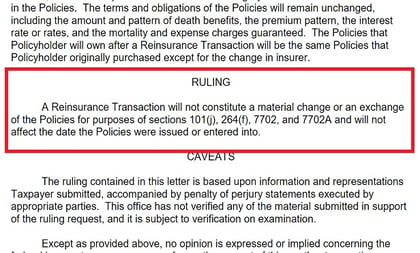The Internal Revenue Service has signed off on a reinsurance deal involving a block of corporate-owned life insurance (COLI) policies.
Dan Phillips, an IRS senior counsel, concluded in a private letter ruling that the reinsurance arrangement would not result in a material change to the policies, or an exchange of the policies.
Phillips also concluded that, for tax purposes, the arrangement would not affect the date the policies were issued or entered into.
The IRS posted the ruling, Private Letter Ruling 202018003, Friday.
The IRS listed the ruling as relating to four subjects: Life Insurance Contract Defined, Modified Endowment Contracts, Amounts Paid in Connection With Insurance (Deductible v. Not Deductible), and Certain Death Benefits (Excluded v. Not Excluded From Gross Income).
IRS officials use private letter rulings to give interpretations of tax rules to specific taxpayers and tax advisors. A private letter ruling may how show the IRS is approaching an issue, but it does not set a binding precedent.
In the new letter ruling, Phillips writes that the COLI case involves private placement variable life insurance contracts.
The taxpayer that sought the ruling is a publicly traded corporate group. Several companies in the corporate group paid “Insurer 1″ for variable life policies that insured the lives of highly compensated employees and directors.
The corporate group has the right to make Insurer 1 transfer the variable life policies to another insurer, through an assumption reinsurance agreement, if Insurer 1 runs into financial problems, or is sold.









 May 04, 2020 at 06:38 AM
May 04, 2020 at 06:38 AM











